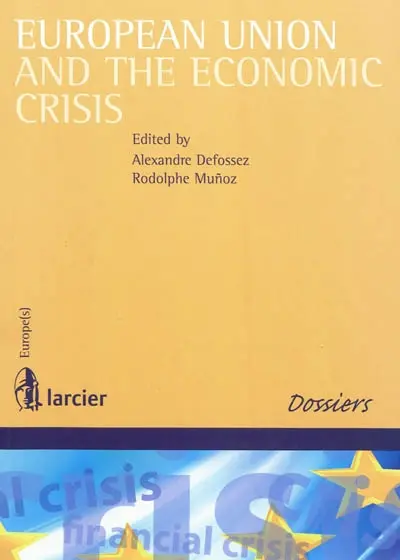en savoir plus

Permet à tous ses détenteurs d'obtenir 5% de réduction sur tous les livres lors du retrait en magasin (réduction non cumulable avec les réductions de type étudiant).
Offre également un certain nombre d'avantages auprès de nos partenaires.
Avec les favoris, retrouvez dans un espace les sélections effectuées au fur et à mesure de vos navigations dans le site.
Constituez pour votre usage personnel vos listes de livres en prévisions d'achats futurs et votre sélection d'articles, dossiers, événements, vidéos ou podcasts préférés ou à découvrir plus tard...
Il suffit simplement de cliquer sur "Ajout Favori" sur chaque page qui vous intéresse pour les retrouver ensuite dans votre espace personnel.
Requiert un compte Mollat
Requiert un compte Mollat
European Union and the economic crisis
en savoir plus
Résumé
Cet ouvrage qui se concentre sur les politiques sociales de l'Union européenne, met l'accent sur les réponses que les acteurs de l'Union et de la société civile peuvent apporter dans ce domaine alors que le continent traverse une crise. ©Electre 2026
Quatrième de couverture
European union and the economic crisis
It just took a few months, and an unanticipated financial crisis, to wipe out most of the growth and employment benefits generated by the recent « EU2020 » strategy. III-suited to the current economic environment, the EU2020 strategy must now be complemented by a new « exit » strategy, to lead the Europe Union (« EU ») out of the crisis. Upgrading the current policy instruments will undoubtedly be a daunting challenge. 2010 is expected to be the annus horribilis for employment figures in the EU, and the real impact of the crisis is still to be felt. Months after months, plants are being shut down and firms restructure. Everywhere throughout the EU, unemployment rates surge.
European citizens and companies expect strong reactions from the EU institutions, not only in favour of growth, but also to protect and create jobs. The EU is thus faced with a major opportunity to take the leadership, and demonstrate to citizens and companies that it is up to the challenge. More generally, the crisis is also a critical test for the EU : Is it able to reconcile its traditional economic purpose with the serious social concerns arising from the crisis ?
In this context, many questions arise :
- Will the EU endorse a proactive role in relation to employment policy ? Will the Lisbon Treaty have an impact on employment and macro-economic policies ?
- Are national subsidisation measures compatible with the EU rules ? In particular, can the goal of promoting employment place a limit on the application of European state aids rules ?
- What can be the role of the EU in relation to firms' restructuring schemes ? Is the Opel case a good benchmark to assess the EU policy in this regard ?
- What about the consultation and the participation of social partners in restructuring processes ? Has EU law something to say about the dialogue between both sides of the industry ?
- Is the European Globalisation Fund (« EGF ») effective ? Can it help achieve the aims of the EU 2020 strategy ?
These are some of the questions addressed by the authors of this book.
Fiche Technique
Paru le : 23/04/2011
Thématique : Economie internationale/mondialisation
Auteur(s) : Non précisé.
Éditeur(s) :
Larcier Intersentia
Collection(s) : Europe(s)
Contributeur(s) : Editeur scientifique (ou intellectuel) : Alexandre Defossez - Editeur scientifique (ou intellectuel) : Rodolphe Muñoz
Série(s) : Non précisé.
ISBN : 978-2-8044-4566-9
EAN13 : 9782804445669
Reliure : Broché
Pages : 132
Hauteur: 24.0 cm / Largeur 18.0 cm
Épaisseur: 1.0 cm
Poids: 230 g

